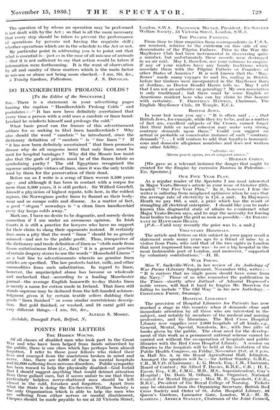POINTS FROM LETTERS
TILE HIDDEN WOUND.
Of all classes of disabled men who took part in the Great War and who have been helped from funds subscribed by the public, there is one class which has perhaps been almost forgotten. I refer to those poor fellows who risked their lives and emerged from the maelstrom broken in mind and nerve. Alas, there are 6,000 of these in mental hospitals and 32,000 suffering from nervous disorders. Public sympathy has been roused to help the physically disabled—God forbid that I should suggest anything that would detract attention from these gallant men, but it seems unfair to me that these particularly helpless nerve-shattered men should be left almost in the cold, forsaken and forgotten. Apart from what the State is doing the Ex-Services Welfare Society is the only Organization which is able to help the men who are suffering from either nerves or mental disablement, Cheques should be made payable to me at 53 Victoria Street, London, S.W.1. FREDERICK MILNER, President, Ex Services Welfare Society, 53 Victoria Street, London, S.W.I.
TILE PILGRIM FATHERS.
From time to time enquiries from correspondents in U.S.A. are received, relative to the existence on this side of any descendants of the Pilgrim Fathers. Prior to the War the Mayflower Club had been instrumental in discovering quite a number, but unfortunately these records were destroyed in an air raid. May I, therefore, use your columns to enquire if any of your readers have any family traditions which associate them with the Pilgrim Fathers or Founders of other States of America'? It is well known that the • May- flower' made many voyages to and fro, ending in Bristol, before her timbers were incorporated in the Mayflower Bars at Jordans, as Doctor Renck!. Harris tells us. May I add that I am not an authority on genealogy ? My own association is only traditional ; but there must be some English or Americana resident here who can lay claim to this honour will certainty. T. DRIFFIELO HAWKIN, Chairman, The English Mayflower Club, 30 Temple, E.C.4.
BRITISH JEWS.
In your last issue you say : It is often said . . . that British Jews, for example, while they try to be, and as a matter of fact are, excellent subjects of the Crown, cannot forget that their faith or racial cohesion may make very strong contrary demands upon them." Could you suggest an actual or probable or conceivable instance of such " contrary demands" ?.. . I will venture to add that loyalty is homogen- eous and domestic allegiance nourishes and does not weaken any other fidelity.
"altorias sic Altera poach opem, rcs et conjurat amicc."
—HERMAN COIIF.N.
[We gave as a relevant instance the danger that might be created for the Empire by excessive Zionism in Palestine.— En. Spectator.] Oust FIVE YEAR PLAN.
As a regular reader of the Spectator I am most interested in Major Yeats-Brown's article in your issue of October 25th, headed " Our Five Year Plan." In it, however, I fear the writer is suffering from misplaced optimism when he says that the average rate of electricity is a unit. In Haywards Heath we pay 10d. a unit, a price which has the result of strangling all electrical enterprise. I should like you to make known this disgraceful state of affairs to counteract what Major Yeats-Brown says, and to urge the necessity for forcing local bodies to adopt the grid as soon as possible.—AN Iammit- TANT OF HAYWARDS HEATH.
[P.S.—Until very recently the price was Is. a unit.]
VOLUNTARY HOSPITALS.
The article and letters on this subject in your paper recall a statement made many years ago to a friend of mine by a visitor from Paris, who said that of the two sights in London that most impressed him one was—to see a big hospital in the most fashionable part of London, and moreover, " supported by voluntary contributions."—H. H.
WAR POEMS.
Miss V. Sackville-West, in her review of An Anthology of War Poems (Literary Supplement, November 6th), writes :- " It is curious that no single poem should have conic from the Navy." Those of us who remember the publication in the Times—shortly after Jutland—of Admiral Hopwood's noble verses, will find it hard to forgive Mr. Brereton far failing to include " The Old Way" in his new Anthology.--. CONSTANCE FROST, Swanage.
HOSPITAL LIBRARIES
The provision of Hospital Libraries for Patients has now reached a stage in this country when it demands close and immediate attention by all those who are interested in the subject, and notably by members of the medical and nursing professions, and by librarians. The Red Cross Hospital Library now supplies over 2,000 hospitals of all kinds, e.g.. General, Mental, Special, Sanatoria, &c., with free gifts of books given by the public. The clear need for the develop- ment of this work as a permanent national scheme cannot be carried out without the co-operation of hospitals and public libraries with the Red Cross Hospital Library. A session on libraries in the hospitals will be held at the invitation of the Public Health Congress, on Friday, November 21st, at 8 p.m. in Hall No. 3, in the Royal Agricultural Hall, Islington, Amongst the speakers will be :—Sir Arthur Stanley, G. E., C.B., M.V.O. (Chairman) ; L. G. Brock, Esq., C.B., Chairman, Board of Control ; Sir Alfred T. Davies, K.B.E., C.B. ; II. L. Eason, Esq., C.B., C.M.G., M.D., M.S., Superintendent, Guy'it Hospital ; Dr. Doris M. Odium, Hon. Organiser, National Council for Mental Hygiene ; Miss M. E. Sparshott, C.C.E., R.R.C., President of the Royal College of Nursing. Tickets may be obtained from the Organizing Secretary, British Red] Cross Society and Order of St. John Hospital Library, 48 Queen's Gardens, Lancaster Gate, London, W.2.—H. lit. GASHELL ARTHUR STANLEY, Chairman of the Joint Council,








































 Previous page
Previous page